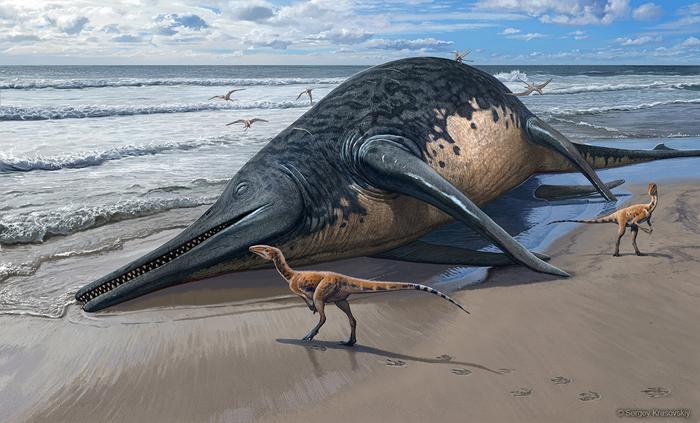A newly described species of ichthyosaur is likely the largest species of marine reptile ever to be formally described, according to a study published April 17 in the open-access journal PLOS ONE by Dean R. Lomax from the University of Bristol and University of Manchester, UK, and colleagues.

Credit: Sergey Krasovskiy, CC-BY 4.0 (https://creativecommons.org/licenses/by/4.0/)
A newly described species of ichthyosaur is likely the largest species of marine reptile ever to be formally described, according to a study published April 17 in the open-access journal PLOS ONE by Dean R. Lomax from the University of Bristol and University of Manchester, UK, and colleagues.
Over the past few years, Lomax and his research team discovered and pieced together individual fragments of an ichthyosaur jawbone from the Westbury Mudstone Formation in Somerset, UK. The new bone was similar in size and shape to another jawbone collected from the same rock formation just a few miles away — and the researchers now believe these two jawbones belong to a previously undescribed species of ichthyosaur, a group of massive, ocean-dwelling reptiles from the age of the dinosaurs.
Based on the length of these bones, the new species, named Ichthyotitan severnensis, may have been a whopping 25 meters (82 feet) long, or twice the length of a city bus. However, since the new species is being described solely via limited bone fragments, the study authors stress that further paleontological evidence is needed to confirm just how large I. severnensis likely was.
Ichthyosaurs, many of which looked like modern-day dolphins, first evolved during the early Triassic period around 250 million years ago. Within a few million years, some ichthyosaurs had evolved to reach at least 15 meters (49 feet) long, and by the Late Triassic (roughly 200 million years ago), the largest ichthyosaurs had evolved, including the newly described I. severnensis. This reign didn’t necessarily last long, however. While some species of ichthyosaur continued to roam the oceans for millions of years, these “giant ichthyosaurs” are believed to have gone extinct during the Triassic-Jurassic extinction event 200 million years ago — and this unique group of marine reptiles never again reached such a gargantuan size.
Dr. Dean Lomax adds: “In 2018, my team (including Paul de la Salle) studied and described Paul’s giant jawbone and we had hoped that one day another would come to light. This new specimen is more complete, better preserved, and shows that we now have two of these giant bones (called a surangular) that have a unique shape and structure. It is quite remarkable to think that gigantic, blue whale-sized ichthyosaurs were swimming in the oceans around what was the UK during the Triassic Period. These jawbones provide tantalising evidence that perhaps one day a complete skull or skeleton of one of these giants might be found. You never know.”
#####
In your coverage please use this URL to provide access to the freely available article in PLOS ONE: https://journals.plos.org/plosone/article?id=10.1371/journal.pone.0300289
Citation: Lomax DR, de la Salle P, Perillo M, Reynolds J, Reynolds R, Waldron JF (2024) The last giants: New evidence for giant Late Triassic (Rhaetian) ichthyosaurs from the UK. PLoS ONE 19(4): e0300289. https://doi.org/10.1371/journal.pone.0300289
Author Countries: UK, Germany, USA
Funding: Initials of the authors who received each award: DRL – Grant numbers awarded to each author: N/A – The full name of each funder: The Royal Commission for the Exhibition of 1851 – URL of each funder website: https://royalcommission1851.org/ Did the sponsors or funders play any role in the study design, data collection and analysis, decision to publish, or preparation of the manuscript?:No, this is part of a Research Fellowship given to DRL.
Journal
PLoS ONE
DOI
10.1371/journal.pone.0300289
Method of Research
Experimental study
Subject of Research
Animals
Article Title
The last giants: New evidence for giant Late Triassic (Rhaetian) ichthyosaurs from the UK
Article Publication Date
17-Apr-2024
COI Statement
The authors have declared that no competing interests exist.




